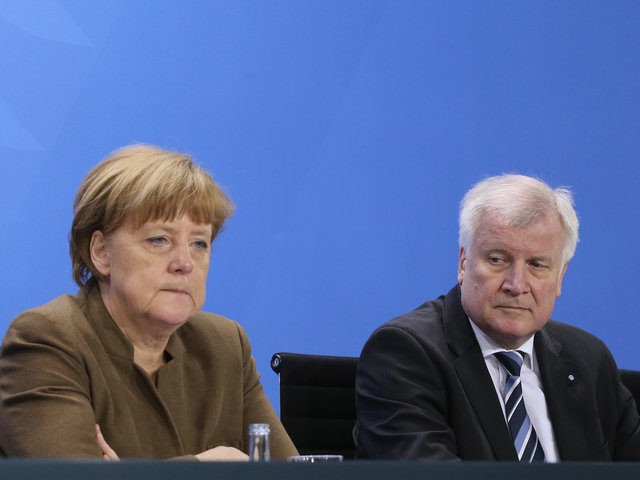The era of Angela Merkel may be coming to an end as longstanding disagreements on migration policies between her and her Bavarian allies threaten to come to a head and potentially unseat the German leader, who has been at the country’s helm since 2005.
The coalition of the Christian Democratic Union (CDU) led by Chancellor Merkel and the Bavarian Christian Social Union (CSU) led by interior minister Horst Seehofer is in crisis over differences on mass migration.
The CSU under Seehofer has demanded that Germany should be able to reject migrants at the border of the country if they have no identity papers, are registered in another country, or have been refused refugee status previously, but Merkel believes turning them away udermine the EU’s open borders Schengen Area.
The Bavarian has threatened to use his powers as interior minister to order the border is secured unlitaterally — a move which would likely result in Merkel moving to sack him, the CSU walking out of government, and her fragile ‘grand coalition’ unravelling.
Germany is currently admitting around 11,000 asylum seekers every month, according to The Times.
Bavarian Leader: We’ll Bypass Merkel and Deport Failed Asylum Seekers on Our Own https://t.co/q9nexGZNg8
— Breitbart London (@BreitbartLondon) June 5, 2018
Disagreements on asylum and migration policy between Seehofer and Merkel are nothing new, with Seehofer previously demanding an upper limit of 200,000 migrants per year and even threatening not to campaign with Merkel and the CDU over the issue in late 2016.
Since then, the rise of the anti-mass migration Alternative for Germany (AfD) to becoming the official opposition to the current grand coalition government in the Bundestag has seen the CSU react by embracing a tougher line on mass migration and champion more conservative social issues, even ordering crosses be put up in government buildings to assert Bavaria’s “cultural identity.”
One of the main considerations for the CSU in the near-term is the looming Bavarian elections scheduled for October of this year. Traditionally, the CSU has managed to form a majority on its own, but the rise of the AfD has sapped away support, leaving the CSU with around 40 percent of the vote according to current polls.
According to German newspaper Die Welt, the current tough stance on mass migration by Seehofer is popular in Bavaria and could explain the party taking the position to try and drive votes back from the AfD.
In the past Chancellor Merkel has been able to dismiss concerns from the CSU but her position is much weaker following one of the worst election results the CDU has ever seen in last year’s national election.
German media have painted a grave picture for the future of Chancellor Merkel, with the Mannheimer Morgen writing that she “has been plucked like a hen after slaughter,” and that her power now merely existed on paper.
WATCH: Hungarian PM tells German conservatives that ‘2018 will be the year for restoring the people’s will in Europe’ as Bavaria prepares to join 'central European alliance' opposed to mass migration https://t.co/4HoU6MWIjo
— Breitbart London (@BreitbartLondon) January 7, 2018
Seehofer has also been far more friendly with anti-mass migration leaders like Hungarian prime minister Viktor Orban, inviting him to Bavaria several times to speak.
In his most recent visit earlier this year, the Hungarian leader said: “The people’s will is clear: the people do not want to live under the threat of terrorism, they want security, they want their borders to be protected, and they want their leaders to take those people out of [Europe] who have no reason to be there.”
Earlier this month Seehofer went even further by joining forces with Austrian chancellor Sebastian Kurz and Italian interior minister Matteo Salvini to form an “axis of the willing” to strengthen the borders of Europe and fight illegal migration.
Chancellor Merkel is expected to make an announcement on her decision on whether or not to accept the CSU’s demands for stronger borders on Monday.
The German people, according to polls, back the stance of Seehofer.
Follow Chris Tomlinson on Twitter at @TomlinsonCJ or email at ctomlinson(at)breitbart.com

COMMENTS
Please let us know if you're having issues with commenting.